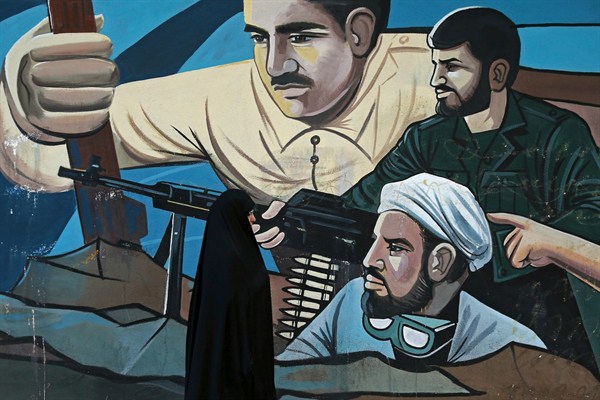The U.S. Treasury Department recently designated a network of 22 Iranian businesses as supporters of terrorism, including several banks and major commodities companies, imposing sanctions on them for their alleged financial ties to a powerful Iranian militia. The goal was to expose and discredit the paramilitary group they are said to finance, known as the Basij, which is linked to the Iranian Revolutionary Guard Corps and, according to the Treasury Department, has recruited child soldiers sent to fight in Syria to support the Assad regime. Yet like other forms of financial pressure from the Trump administration, these sanctions likely won’t curb Iran’s destabilizing influence in Syria or the region, falling short of sweeping new U.S. objectives.
These sanctions follow an announcement in late September by the Trump administration pledging to keep U.S. troops on the ground in Syria until Iran and its proxies have left the country. That commitment extends far beyond the goal of defeating the self-proclaimed Islamic State. The Trump administration’s new vow to push Iran out of Syria relies heavily on squeezing Iran financially, including through additional sanctions on Russian and Iranian entities linked to operations in Syria. The plan also involves withholding reconstruction aid from the territories they are helping to hold and control for Syrian President Bashar al-Assad.
But these financial measures are not enough to achieve such broad and new American objectives in Syria. The administration’s strategy of economic coercion will further isolate Iran from the global financial system, but there is no track record—or reason now to believe—that such a strategy will compel Iran to withdraw from Syria. For one, financial constraints will not force concessions from Tehran due to current dynamics within the Iranian regime, and they will do little to impede the operations of targeted Iranian entities like the Basij and Revolutionary Guards. After all, Iran didn’t curb its regional behavior even when it was under maximum, multilateral sanctions pressure between 2012 and 2015. What’s more, squeezing Iran financially will feed the division between the United States and Europe over how to address threats from Iran, whether its destabilizing activities in Syria and Yemen or its ballistic missile program. That is bad news for current and future U.S. policy.

